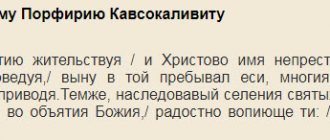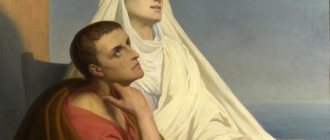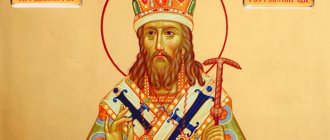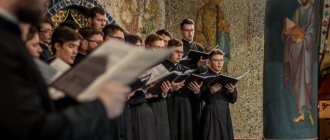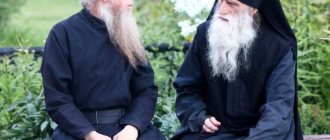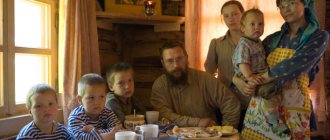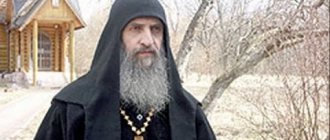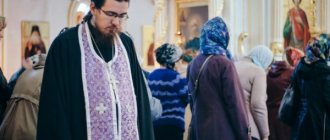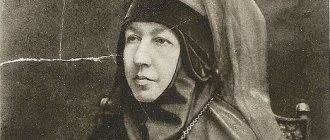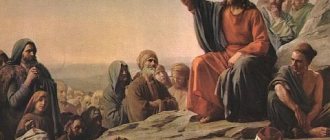Tsvetoslov of advice
From the translator’s annotation on the website https://www.isihazm.ru:
Elder Porfiry Kavsokalivit is very widely known in Greece. We will not be mistaken if we say that this is one of the most revered elders of the Greek Church. There are about ten books in Modern Greek about Elder Porphyry Kavsokalivt. All books are very different.
There is no doubt that the best and most profound book is the publication by Anastasia Dzavara “Memories of Elder Porfiry.” Here and below the translation of the names is our own. This book is apparently not published in Russian. The memoirs of Anastasius Dzavara are a golden fund of teachings by Porfiry Kavsokalivit. Anastasios was the elder’s favorite child, and Geronda revealed to him, as we would say, the Secrets of Divine Love.
The second most important book is “Elder Porfiry Kavsokalivit Life and Words.” This is a collection of teachings selected from other memoirs. This book contains the Autobiography of the Elder and some teachings. (However, the translation cannot be considered satisfactory for reasons that can be found out in more detail on the website).
The third book, “The Flower Book of Advice,” is also not original. This is a compilation from various publications. If the second book contains the original Autobiography of the Elder, then here it is only a selection of teachings on the basis of a symphony. This book makes a pleasant impression mainly because it contains a lot of advice from Anastasia Dzavara’s publication “Memories of Elder Porfiry.”
The book “Tsvetoslov of the Councils”, like the second “Elder Porfiry Kavsokalivit. Life and Words”, published by the Monastery of the Life-Giving Spring; the symphony was collected and prepared by nuns. In this regard, I just want to remember: Elder Porfiry Kavsokalivit himself said that women and men have too different spiritual paths. What is important to a woman is not always suitable for a man...
The fourth book worthy of attention: George Krustallaki “Elder Porfiry - Spiritual Father and Mentor”, this book has also been translated into Russian. This is one of the best books about the elder. The book includes original memoirs.
We will only briefly mention the remaining books. This is the book of monk Agapius “The Divine Light that Elder Porfiry kindled in my heart”, the book of Yannitsyoti “Near Elder Porfiry”, Ioannidi “Gerondikon”, Hieromonk Damascene “He who is virtuous for the sake of God will be loved by Him...”, Ioannidi “Elder Porfiry”, Anastasia Kaliatsu “Father Porfiry”, “Elder Porfiry” published by the publisher of the apostle Barnabas, and, of course, the book of Hieromonk Christodoulus Agiorite.
We decided to make a complete selection of the elder’s teachings, because we do not understand on what basis one teaching can be chosen and another thrown out. This approach surprises us extremely... The translation of all teachings was done by the monk Macarius Kavsokalivit, using, where possible, the existing Russian translation. However, we do not organize these teachings into a symphony, and have even decided not to maintain a precise division into passages.
The fact is that all the passages are too different in volume and information content. And besides, this is ugly and not acceptable for publishing text on the portal. For example, look at the Autobiography: one page contains three paragraphs, and the other contains three pages. We did not know who compiled the Autobiography and who titled the passages, how it happened, whether the Elder participated in it. Therefore, we have retained the tabulation of the original source.
But in other cases, such unevenness can be avoided. We will not provide a quotation either, so as not to confuse the reader with Greek sources. But if anyone wants to read the original text, write - and we will give exact links...
(In the electronic edition, the teachings on illness are placed at the end of the book, since illness was not the beginning, but the crown of Father Porfiry’s asceticism).
Life of an Elder
The elder’s entire life path was filled with service and love for God and people. From early childhood he took the path of monastic feat and did not leave it until his death.
Elder Porfiry Kavsokalivit
Childhood
Porfiry Kavsokalivit (Bairaktaris) was born on February 7, 1906. He himself comes from the small village of Agios Ioannis in Greece, in the province of Evia. The parents were poor, so the boy's father had to go to work in America as a simple worker for the construction of the Panama Canal. Evangelos, as he was named at birth, worked hard with other peasant children from an early age. He looked after the livestock, looked after the garden, and carried out errands for adults.
The boy grazed sheep in the mountains from a very early age. He was a shy and naive child. I went to school very little, only one class. I learned almost nothing there, since the teacher was often sick and missed classes. There, high in the mountains, Evangelos read the life of St., syllable by syllable. John Kalivita, and for the first time he had a strong desire to leave the world and become a monk.
When the boy was 7 years old, he was sent to another city to work in a store. There were always a lot of people there, and one day two old men came in. They talked about Mount Athos, and one of them reminisced about how good it was to serve as a monk there. The old man lamented that he had once made a big mistake and left the monastery back into the world.
Interesting! The desire to devote himself to monastic life flared up with renewed vigor in the boy’s heart. He really wanted to imitate St. Ioanno Kalivitu, whose life I re-read from time to time, dreamed of becoming a hermit.
Evangelos became sad and thoughtful. The owner thought that the boy missed his mother and sent him home for a few days to visit his family.
The boy was put on a ship that went through his native place to the Holy Mountain. His dream was beginning to come true. On the way, Evangelos was seized with fear and anxiety, doubts tormented his soul. The boy didn't know if he was doing the right thing by leaving his family. As a result, Evangelos transferred to another ship and returned to his owners in the store.
About other elders:
- Iliy Nozdrin
- Elder Gabriel Urgebadze
- Elder Seraphim Tyapochkin
But the thought of a monastic life did not leave the boy, and soon he made a new attempt to get to the Holy Mountain. Just like the first time, having asked for leave to visit his mother, Evangelos boarded the ship and again, frightened, returned. Only the third time the goal was achieved. The boy, together with his uncle, who at the same time became his confessor, ended up on Athos. Despite the fact that children were forbidden to come here, Evangelos, thanks to the intercession of his elder, miraculously ended up on the Holy Mountain and remained to labor in St. George’s cell in Kafsokalyvia.
Stay on Mount Athos (1818-1925)
From then on, the boy began a completely different, grace-filled life in Christ - daily visits to the temple, obedience. Thanks to frequent reading of the psalter and prayers, Evangelos began to read well and learned a lot by heart. At first, the young ascetic was tempted by thoughts of his parents and brother, whom he wanted to bring to the holy mountain so that he would also join in this happy, equally angelic life.
From the thoughts that tormented him, the boy became pale and haggard. But by confessing them to his confessor, he received liberation, joy and peace in his soul. He continued only to pray for the salvation of his family, without indulging in painful experiences, as before. If before this Evangelos missed them, now he experienced the same feelings towards his elder. This is how the first temptation was passed.
The young novice was burning with spiritual zeal. He began to fast and labor more. Now his only desire was to constantly be in church and fulfill all the obediences given by the elders in order to bring them joy. Evangelos went to the garden, weeded, watered, studied handicrafts (wood carving), read the psalter, learned how to humble himself, how to strengthen himself in the love of God. His life was prayer, joy, obedience to the elders. Soon he became a monk with the name Nikita. The young man never wanted to leave the Holy Mountain, but God’s Will was different.
Saint Porfiry Kavsokalivit
One day after the rain, a young monk, like other holy fathers, went to collect snails. He picked up a full bag and was already moving towards the cell, when, unbeknownst to himself, he fell into a scree. In the fight against mortal danger, the young man was very sweaty, and since it was already evening, a cold wind blew through his body. After this incident, he fell ill with purulent pleurisy and became increasingly worse. The elders decided to send the young man into the world so that he could avoid death and improve his health.
Return to the world
So, at the age of 19, the young monk left Mount Athos and returned to his village. One of the first people he saw was his father. The meeting was joyful and very touching. Unfortunately, the mother never forgave her son for becoming a monk, and the young man settled in the monastery of St. Harlampius. When I felt better, I hurried to Athos again. But two weeks later the young man became worse and was blessed to return to the monastery of St. Harlampy. So it was repeated three times.
Since then, the young monk finally settled in the monastery of St. Harlampy. I went to obediences and prayed. His mother changed her attitude towards him and was now proud of her son. At the age of 21, with the blessing of the Bishop of Sinai, Porfiry III, the young man was ordained a priest, although he did not strive for this. He liked more the solitary monastic life, filled with silence and prayer.
About prayer in Orthodoxy:
- Prayer rule of Seraphim of Sarov
- How to teach children prayer
- What is the prayer rule?
Now he confessed to people coming to the monastery, and sometimes the confession lasted two days without a break. People liked the young priest and they returned again and again, seeking healing from sins and spiritual wounds. Soon, despite his young age, he was appointed monastery confessor.
A line of people came, and the priest tirelessly received them, comforting, healing, instructing them on the path to God. He fulfilled this obedience until 1940, and in 1938, for tireless and hard work, he was awarded the rank of archimandrite by his confessor. Then the elder was transferred to Athens, where he served as parish priest at the hospital, in the church of St. Gerasima, a whole thirty-three years.
Interesting! During this time, he healed many people from various diseases and set them on the path of salvation. After retiring, Elder Kavsokalivit did not stop serving God and people.
Until 1978, when he had a heart attack, he performed the duties of a priest in the abandoned church of St. Nicholas (Pendeli district). After staying with his friends for several months after his illness, he moved to live in the Milesi area. There he again took up active work and built a large temple with a courtyard in honor of the Transfiguration of the Lord.
last years of life
All this long time the elder did not give up hope of returning back to the Holy Mountain. In 1984, his dream came true and he spent the last two years of his earthly life on Mount Athos. Having learned that the last inhabitant of St. George's cell had gone to live in a monastery, the elder hastened to go to his native place.
Not far from the cell, at his request, a grave was dug. The elder felt the approach of his death. On the last night he confessed, and the assembled disciples began to read the canon on the outcome of the soul, then the schematic rule on the rosary. The bright soul of the elder left this world on December 2, 1991. And in 2013, on December 1st, Fr. Porfiry Kavsokalivit was canonized as a saint by the Synod of the Patriarchate of Constantinople.
Liabilities
Why do you feel obligated?
I was greatly touched by the help shown to me with great love by one brother in Christ, whom Father Porfiry recently introduced me to. Once talking with the Elder, I told him that I felt very obliged to this man. Suddenly he asked: “Why do you feel obligated? Did he work only for you?” “Of course, Geronda, he did everything completely disinterestedly just for my sake,” I answered. “It cost him work, time, money, he had to come from the neighboring town where he lives... And all this is completely unselfish.”
The elder asked another question: “Why are you separating yourself?” “How is it, Geronda,” I asked. - I don't understand". - “Have you not read the words of the apostle: If one member suffers, all the members suffer with it; if one member is glorified, all members rejoice with it? [160] Have you not understood that if, as a Christian, you live alienated from your brothers, if you do not deeply realize that you are united by a living connection with other members of the mystical body of Christ, that is, His Church, through the unbreakable bonds of love, then are you not a true Christian?” I understood what the Elder was talking about and fell silent. What could I say? That everything he just said is familiar to me, but only theoretically? What is theory worth without practice? Father Porfiry, in his words, which were backed by personal experience, made clear what he once wrote: “It is true that without love for people you cannot love God. But it is also certain that only through the love of God can you truly love people.”
Nutrition
For the glory of God
Even the most “ordinary” actions of the Elder exuded the aroma of spirituality. One day, entering his cell, I found Father Porfiry sitting on his bed and having dinner. Without interrupting lunch, he blessed me and invited me to sit down. Such spontaneity of the Elder filled me with joy. Sitting on a chair opposite Father Porfiry, I silently watched him. It was an unusually pleasant sight. With his left hand, the Elder held a deep plate of vegetable soup on his knees, with his right hand he held a spoon and ate, bent over, in silence, with attention, humility, with gratitude, as if he was participating in some kind of secret action.
I regretted that at that moment I did not have a video camera with me to capture this scene and then show it to my friends as an example of a spiritual silent picture called: “The Saint Eating His Simple Food.” Looking at the Elder, we would be filled with joy and repeat the words once spoken by a monk who visited the great hermit: “It is enough for me, Geronda, that I see you.” We would deeply penetrate the words of the Apostle Paul: So, whether you eat or drink or whatever you do, do it all to the glory of God[161]. We would unwittingly compare this ascetic picture with the picture of our lunch with tasty, satisfying, rich, well-cooked food.
To be fair, it should be noted that the Elder very often advised and even gave recipes for preparing delicious dishes and sweets. By this he clearly showed that he did not want us to remain indifferent or to be deprived of all the beautiful things that God’s love has given us.
Curiosity
The elder read various educational literature
The ever-memorable Father Porfiry received only a primary education in the world. However, despite this, he, having acquired wisdom from above, was a real sage. Possessing natural curiosity, he loved to read various educational literature. The elder read books from a wide variety of fields of knowledge, in addition to theological literature, which he read with special attention. He read books on medicine, physics, astronomy, etc.
Fear
God loves us very much. There is no need to be afraid of anything
On a summer evening, sitting under one of the pine trees growing near the temple, the Elder told us that we must have unlimited trust in God’s providence. “Remember what the Holy Scripture says,” he said, “even the hairs of your head are all numbered [162], and this is indeed so. Nothing in our life is accidental. God cares about even the most insignificant things and events that happen to us. He cares about us, so we are not alone in this world. He loves us very much. Not for one second does He forget about us. He constantly protects us. We must remember this and not be afraid of anything.”
return 160
1 Cor. 12, 26.
return 161
1 Cor. 10.31.
return 162
Mf. 10.30.
